Well, I never thought I’d be writing about a Pinto. There was a lot of angst that surrounded the Pinto and its GM competitor, the Chevrolet Vega. These were troubled, early ‘70s designs that came about when the big two started to take German and Japanese competition seriously. For many years, the only discussions around these cars involved recalls and complaints. Time has a way of changing perspective so with that in mind let’s review this 1974 Ford Pinto, located in Eaton, Colorado and for sale here on craigslist for $5,500. Thanks to Ian C for the tip!
The Pinto was to the ’70s what Ford’s Falcon was to the ’60s, a small economy “import fighter”. The Pinto started out with a bang (more on that pun later) by selling 352,402 units in its inaugural year of 1971. In our subject year, 1974, sales reached its zenith of 544,209 examples. I have to admit this example looks great; I haven’t seen one of these in the “steel” for years – they weren’t built to last and were used, abused, replaced and now mostly gone.
One of the initial gripes of the Pinto was lack of power due to its introductory 1.6-liter, four-cylinder engine. This ’74 sports a 2.0-liter, four-cylinder, OHC engine wringing out 86 net HP. Fortunately, this Pinto is equipped with a four-speed manual transmission which will help a bit with its motivation. While there are a good number of visual images included with the listing not much is said about the car, specifically no reference made as to how it runs.
The interior is typical Pinto but appears to be very clean. The vinyl bucket seats look to be in good repair with no visible rips; the two-tone color scheme makes for a nice effect. The seller states that this Pinto only has 34,000 miles so that explains a lot regarding this example’s sharp overall condition.
The seller does state that this is a “California car with no rust” and I believe it. There are no visible signs of rust which claimed many a Pinto long ago. The body panels all appear to be straight. The biggest gripe in my mind, regarding the exterior, are those park bench 5 MPH bumpers – seriously ugly. I have to believe Ford could have figured a better way to accomplish that requirement without having the car look like it has a fat lip.
So, the elephant in the room is the Pinto and its reputation. The Ford Pinto, like many cars of the era, had a fuel tank that was mounted between the rear bumper and the differential. On a hard, rear impact the bumper would push the fuel tank into the differential causing it to rupture and potentially start a fire and/or an explosion. This problem was recognized early on in Pinto production but did not result in a recall until June of 1978. But before the National Highway Traffic Safety Administration (NHTSA) actually ordered the recall, Ford took the step of voluntarily recalling 1.5 million Pintos. The on-going problem and recall were fodder for late-night TV hosts as well as fuel for a multitude of lawsuits – the issue forever tarnishing the Pinto’s reputation. Now if I were interested in this Pinto, I wouldn’t let that recall bother me at all – many cars were designed that way, the Pinto just had more of an issue with it than some others. I don’t really think of the typical rough Ford Pinto as a collectible car but this one isn’t your typical worn-out Pinto.
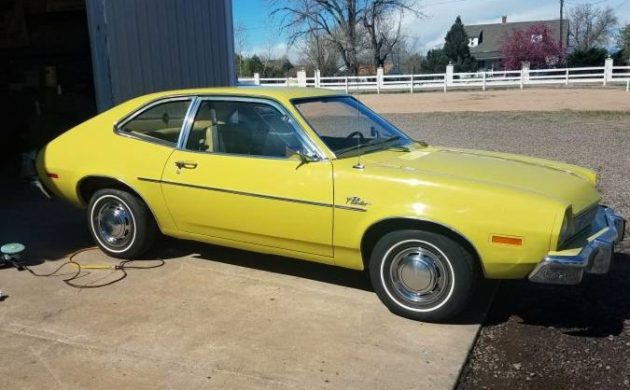
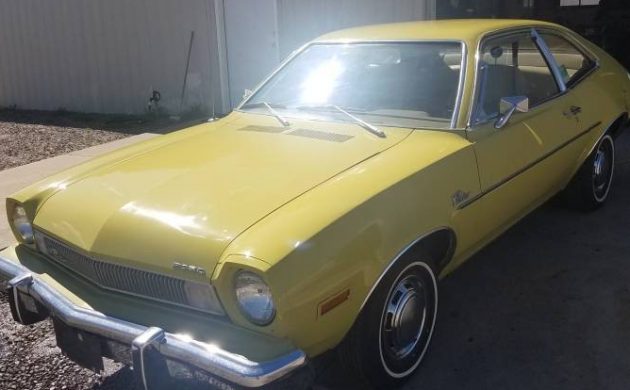
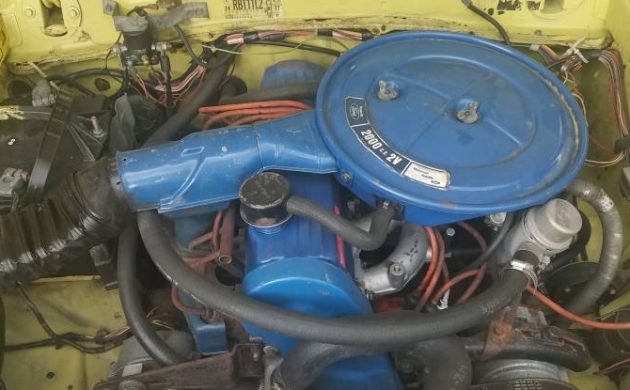
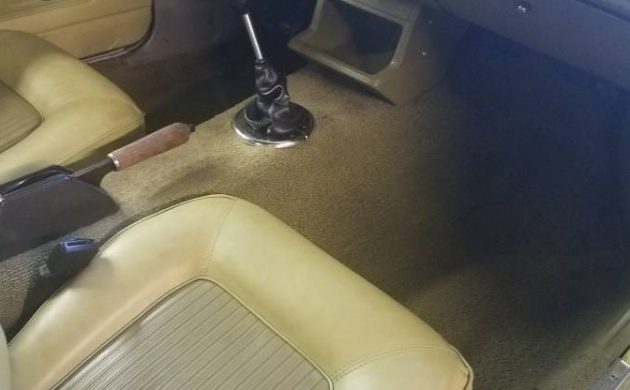
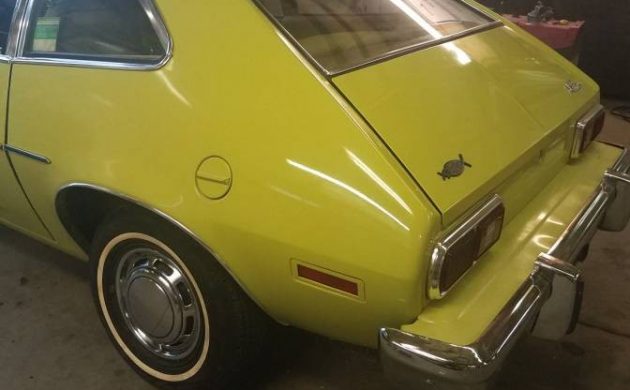
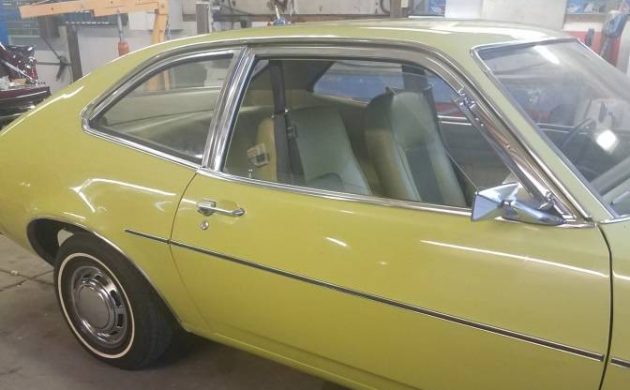




Great write up, Jim, the Pinto was as important a car as a GTO, more so, even. I happen to like Pintos. My dad dabbled in used cars in the 80’s, and Pintos were his bread and butter. He got them cheap, they were a dime a dozen, and an easy sell once repaired, so I’ve seen a couple Pintos. Most with front damage, and guess what, I never saw one burned up rear ender. Shows how media can whip things into a frenzy. This is a great find. This car changed everything and should be in a museum, if anybody still cared,
“…as important a car as a GTO…”?!?
OK, that’s a bit of a stretch. :-P
Just keep in mind that Howard said it was as “important” as a GTO. He didn’t say “significant” or “better”.
I think what Howard was referring to was the car’s importance to the US Automobile Industry in fighting back the onslaught of imported cars at the time.
On a related note: Google “October 1975 Car and Driver Magazine” and check out the results (images). You’ll see gracing the cover was the new Chevette with the proclamation: “The Most Important Car Detroit has Ever Built”.
It’s this sort of “Importance” that Howard was referring to.
Also Howard a yugo is as important of a car as a 65 mustang if not more!………well it least the Yugo is better built then a mustang II, which is by the way built on a garbage pinto platform.
So I kinda see how things really could be stretched……GTO and Pinto bahahahaha
Pinto’s are pure junk it’s a well know fact!
I do wish some of these pinto fans what go look up the factory engineering reports from Ford, then they will understand the hate for these cars and the
Mustang II…..we knew they where junk before they ever left the factory.
All in fun thanks for the laugh!
these heaps were cheap in so many ways, i had the great displeasure of getting sucked in flying from toronto ontario to dade city florida to drive one of these gutless things back to toronto as the couple who owned it got sick down there and were flow’n home! never again! dodge omni was 5 times the car! and thats what I drove for years
I’m with Howard, I too like Pintos. No, they weren’t great cars, but not much in this era was– especially when viewed through the lens of today’s cars. I like to see preserved throw-away cars which have survived all these years. Yellow with an avocado interior, certainly light years from what is offered today. Kind of fun to drive with the manual transmission.
Lots of people have good memories of Pintos. For someone who wants to re-live those days, this is a good example at a reasonable price.
It appears to have taillights from a 1977 or 1978 version.
Yes I saw that too. Why would such a low mile, well cared for car, have newer tail lights?
There is always more to the story.
Good heavens, maybe it was hit in the back, and didn’t blow up? Myth busted.
Pintos were everywhere in the 70s when I was a kid. They were very spartan and seemed really cheaply made to me. My Dad’s VW bug was just as spartan, but it was built like a Mercedes. Everything felt solid and substantial.
Did you say a VW Bug was built like a Mercedes and was a solid car?
So that engine that was mentioned in the write up for the initial offering, was the 1600 Kent crossflow engine. You could easily build those up to produce a minimum of 100+ hp. Really, almost bullet proof. They were in the Mk2 Cortina that Ford built in England and sold here until the introduction of the Pinto. They did not want to sell competing cars. 1970 was the last year of the Cortina here in the States. You do see some now in England with the OHC engine from the Pinto and Capri.
In 1969, American carmakers began a rapid phaseout of building cars, and began building “something else”. The Pinto was a flagship of this “something else” movement. For many, they did not see the difference and just went on buying them like normal. For some of us, it was “game over” and everything from that point on was as attractive as a turd sandwich. With all the cars a person has to choose from, built before 1970, dollar-for-dollar, interesting points-for-interesting points, there is no reason I would ever ever look at a post-69 car, let alone discuss the “good points”. I just don’t like turd sandwiches. No amount of discussion is going to change that.
Others may have a warmer, more nostalgic viewpoint, and that is fine. I think the carmakers took a whole new tact in selling the public the least amount of value for the maximum amount of money, and have held them in contempt ever since.
As a laugh, my brilliant carguy Father took Mom’s 1966 Mustang GT fastback in to Cascade Ford and we left with a beautiful turd brown metallic 72 Pinto, complete with underhood noisemaker, automatic powerrobber transmission, faux wood siding, and monthly payments ! Way to go, Dad ! Kinda like like paying $100 down for a dollar, and 36 easy payments of $10 until that dollar is paid off !
Dear Old Dad, …. turning gold bars into turds since 1927 !
Something else to remember was that the early 1970s were the beginning of Federal government intervention into automotive design. The EPA was beginning to enforce the Clean Air Act, the NHTSA was beginning to mandate safety rules, and the insurance companies were continuing to put the screws to performance cars.
It was the beginning of the Malaise Era, we just didn’t realize how long it would last.
There was an article in the Syracuse NY paper, years ago, which listed terms used in automotive ads and their true meaning. Words like “Solid!”translates to “Doors rusted shut”. “Starts well”=”won’t move”
And “Hot car” described either non-functional AC or a Pinto…
With that said,The song “little GTO” was most likely heard throght the Kraco speakers poorly installed in a Pinto. GTO was what you wanted, Pinto is what you drove. That is an important thing to consider in terms of comparing the “value” of a car model.
Go back a few listings to the 1974 GTO that was on here. Cars are a reflection on the society of the time.
The difference is that 50 years from now the Tesla you had the foresight to store away will be inert due to unavailability of a battery and failure of the electronics.
These old Pintos always bring me memory of my first drive and impressions! My college buddy just survived his tour in VN, bought one ’71 and we took it for a spin, It was no frill car, 1600cc engine & 4 spd. but an AM/FM radio! I was impressed by the way it handled-probably the first U.S. car that had the rack and pinion steering? I was impressed because I was the BMW 1600/2002 “snob”. Yes it was cramp but it did provided your basic cheap transportation. The first thing we did to his car was, we made a “bumper sticker”: Approach With Caution! We don’t Want To Be BBQ’d”. My buddy got rid of his work horse 10 years later and wasn’t BBQ’d!
Clean Pinto, can’t dispute that, but the as it sits it offers about as much excitement to drive as a Yugo. That little 4-banger has 26 less hp than my ’97 Ford Ranger which is anemic to say the least. I’d be inclined to swap in something with a little more get up and go like maybe a V6 or a small V8 though the swap might have to include a beefier stick shift and rear end. The price might be a little steep considering the puny 4 cylinder under the hood.
Nice Pinto…like the ones with a trunk instead of the hatchback.Had a 79 wagon…good in the snow with snow tyres.
Good in the snow? You must be joking, In the northeast where I grew up you were scared to death to drive one of these death traps in the snow!….well you where also scared to drive one on a sunny dry day!
Besides that they rusted out in 45 minutes! The most rusted car I had ever seen in my life was a mid 70’s Pinto in the early 80’s….you could actually unlock the driver door from the outside because the doors skin was rusted up and gone all the way to the body side molding. (This was my college friends car) that Pinto was junked with under 50,000 miles.
My wagon was good in the snow here in PA….don’t know how the non wagons were.
$5500.00 later, you have a yellow Pinto that doesn’t even get a second look. You can do much better with your $5500.00
Oh, you’ll get a second look, …. the same look you would get if you shat yourself and walked around that way. The wifeperson had the ultra-awful looking later version with the square headlights in that delightful deep metallic green. She gets all warm-n-fuzzy just thinking back on how “cute” it was. Taste in cars is largely perspective. While she was groovin’ around in her green Pinto, thinking it was nothing to be embarrassed about, others had given up on the idea that new cars were somehow better than previous years, and hung on to our “out of style” 50’s and 60’s iron. Anyone else remember people and their “disapproval” of those who drove those “hideous gas guzzlers” ?
I couldn’t disagree more about not getting a second look. Makes me wonder if you’ve ever been to a car show where a car like this (or similar car showed up)? I have, but it was a baby blue Pinto with an amazing plaid interior. It drew more attention that day than ANY of the other 200 or so cars at the show, and won first place in its class. I was also on the receiving end of it when I brought a ’76 Chevette Woody to a show several years prior to that. People would walk past the endless rows of Mustangs, Camaros and Roadrunners and stop and look over that Chevette from every angle and it brought a smile to all their faces. Some loved it, some made jokes, but everyone was glad to see one again.
You wanna know what REALLY will never get a second look? A Camaro or Mustang costing 4 times what this Pinto cost…
This begs the question, why does a person own an old car ? Is it to drive ? Childhood nostalgia ? To get attention at car shows ? Why does someone go to car shows ? To waste whole weekends standing around in a hot parking lot ? The old car culture is dominated by folks who just want attention and have nothing better to do with their summer free time than see the same cars over and over at various parking lot shows. In fact, the organizers get them to PAY money for the honor of showing off their attention-getter ! They get a “free” patch or dash plaque, and if their car gets the most “likes”, they might even get a cheesy trophy or ribbon ! WOW !
Now, don’t read me as a total Negative Nelly. When I see a Pinto or any other old car going down the road, it puts a smile on my face. If Pintos were bad, things only got worse, so they actually seems kinda fun and funky today. But to confuse one’s personal nostalgia for a car being “great” ? These were and are ugly, toady cars. The tangible evidence of the great American automotive scam that our drone society still suckles on today. Just look at what you pay for a plastic POS these days, that has all the good looks of a suppository and the owner can’t work on themselves without double-the-vehicle-cost in diagnostic equipment. Yup, … at least with a Pinto, they had not made owner-done oil changes impossible yet. For all the great old cars that go begging for preservation ….
@Howard A…
Notice how the Pinto receives more comments than any other post in the time frame ?
Feel the passion !
Nothing but great memories and reliability. Then along come Nader and NHTSA to save us from ourselves.
Love the car !
Hi Michael, The only thing I can figure, is people with negative comments about the Pinto didn’t live through that time. Automakers were scrambling, look what AMC offered, a chopped Hornet, and we won’t even get into the Vega, which, I thought, properly maintained, wasn’t a bad car either. I’ve said many times, people killed these because they were used to 429 LTD’s, these didn’t have a chance.
I owned a 1976 Pinto for five years, drove it 75,000 miles, up Pikes Peak, along Canada 17. My biggest beef was with the engine. It had the 2300cc engine, and the rings wore out quickly.
I am just surprised that anybody would want a car like this and that it still exists….according to the engineering if they could last for, or hold up for 50,000 miles that was more then expected! so I guess this one may still have 16,000 miles left in it.
I hate these cars because they represent Ford motor company at its worst. If you knew what went on inside of the Edison NJ plant…you would never buy or like this car….the line workers did not care at all how they were built..the engineers were not given realistic budgets for what was needed….The plant workers knew how poor this car was (even for the times)… the supply vendors were told to cheapen every part up (not looking for longevity here) a documentary was done on how poor this plant was, line workers would mess things up on purpose to fight of boredom (union protected).
So go ahead praise this horrible car …you really do know what it is!
All pintos and mustang II’s need to be crushed and forgotten about.
I know these car better then most people would ever want to..which is why I always put them down.
To anybody foolish enough to buy, I would recommend doing some research first.
As much as people love to hate the Pinto, I owned a 1971 and enjoyed the heck out of it until it was hit hard on three sides in a pileup on I-57 south of Chicago…and the only injury I had was from a plastic bottle of anti-freeze flying about the interior of the car. The frontal impact took off my wedding ring, and I was slammed from behind by a Buick 225 Electra. I wore my seatbelt snug, and that, plus the strength of the Pinto’s chassis, kept me safe. What’s your experience with a Pinto?
Further, I’ve always liked the design of the Pinto, at least before the five-mph bumpers, but then everything had those railroad ties hung front and rear. The Honda Civic’s front bumper extended a full foot–12 inches–from the front bodywork. Of course, design is subjective. but the Pinto had an integrated design, well balanced and as good as anything coming out of Europe and most of anything from Japan. For it’s wheelbase it was roomy inside. Two moderately-sized adults could ride in the back seat.
Performance-wise, the 2000cc (we used cc instead of liters back then) sohc crossflow German Ford engine was rated at a (gross) 100 hp, and per Road & Track tests would get to 60 mph in 11.4 seconds, compared to the Vega’s 14.2 seconds. With the optional front disc brakes would go 80-0 mph in 270 ft versus 33 for the Vega.
Road & Track gave the Pinto kudos for its handling, calling it’s skid pad “good.” Said R&T, “Neutral describe the handling. The Pinto has a tendency to oversteer at the limit with the tail coming out even with a steady throttle.” My own personal experience was that the cloverleaf skid pad performance was limited by the inside rear wheel lifting and spinning on the pavement. The car couldn’t go faster because it couldn’t get any more power to the ground.
Like most cars of its era, regardless of size, it had a live rear axle on leaf springs, and on rough pavement tended to hop around, even worse braking, but on smooth pavement, it was just about as good as anything. The Vega was better.
The only reliability problem I had was with the alternator. The bearings would disintegrate on a regular basis. The Ford shop knew me well and replaced the alternator free of charge under the parts/service warranty. I probably revved the engine tighter than Ford engineers expected. The same engine in the Capri had a different alternator mounted differently.
Complaints? No tachometer, just a giant empty dial. And the seatbacks didn’t recline. Plus no alloy or even styled steel wheels (like the Vega GT) were available.
Road & Track in conclusion said the Pinto “isn’t as much fun to drive as most of the imports (the magazine had an import bias, he notes) or as luxurious as the Toyota (really?), but if your motto is Buy American the 2-liter Pinto with disc brakes begins to look awfully good.”
I have no regrets over my purchase and two-year ownership of the Pinto and would have kept it were it not for the accident. Your personal experience with the pre-Federalized Pinto may differ, but that’s my take.
LOL, … you should have ordered the Talladega Package ! With a C6 and SCJ 428 and full ground effects treatment, the Pinto Talladega could do 220+ in reverse ! They were twice as fast and nimble in yellow paint !
I preferred Grabber Blue. It added 15 horsepower and wouldn’t spontaneously burst into flames.
Grabber Blue was good, especially with the Periwinkle and Cocoa power accents. My book doesn’t list ratings, but that delicious caramel color of those days was especially sweet. The matching color-painted wheelcovers were particularly nauseating. The visual equivilent to a bag full of spent diapers, left in the trunk for a week in August and an 8-track of period favorites like Having My Baby and Playground In My Mind.
And I, too, have no regrets about the Pinto I owned for a while, had no trouble with, and moved along with traffic and congestion on the Left Coast with ease even with an Automatic in it. Bought it used, payed nothing for it, spent about $600.00 in those days if i remember and everything was fine. I drive old cars, I would not touch a new piece of junk if you paid me ( you don’t have to) and I can afford to buy many of the overpriced pieces of junk.
I’m truly sorry if I crushed a few Pinto dreams earlier with my comment. It’s just not my kind of $5500.00 car!
Let not your heart be troubled. I’m handling the dream-crushing remarkably well.
A friend of mine got one of these from his Dad who had paid $75 for it in the early 1980’s. His Dad told him he could have it painted any color; he chose the most god-awful pumpkin orange you can imagine. We drove the wheels of that thing, even after the shifter broke off and he had to shift with a pair of Vice Grips clamped to the nub. The leaf springs snapped and fell off on a trip across country, so he just put all the pieces in the trunk and motored on. Said it rode a little rougher but basically the same.
The Pinto and the Vega, my sister in law had the latter, my cousin had the other, typical mid 70s 30 somethings, pick up the kids food and school runs, the Vega was the luxury car w a/c and am/fm and 8 track tape in the glove box. Both were probably starting to decompose on the showroom floor
In the NJ plant where lots of Pintos where assembled you could actually see the flaws where rust would take hold in the very low quality steel before the cars where painted….back then Ford (and others I’m sure) would use the lowest cost/quality steel the you could possibly get….probably starting to rust as we where loading up for transport even before the hit the showroom floor.
Some People that owned these cars claiming they where dependable cars…..they either forgot how undependable they really were, didn’t own them for that long or are just plan fabricating the truth.
If you love your Pinto, find the car aesthetically appealing and have a good memories with the car I can certainly understand and appreciate that!
However don’t make up stories like…I got 150,000 out of the original motor, car never leaked oil on my driveway, car had no rust after 5 Rochester NY winters!
because the people that really know these cars know that’s simply impossible. That the equivalent of saying “I got 600,000 miles out of my last set of Firestone tires on my 2001 Ford Explorer before I had to replace them.
How about, my Datsun 510 that replaced the Pinto rusted faster? Remember that this was the era that made Ziebart stockholders rich. Everything rusted. Everything. To single out the Pinto or even Ford… I don’t care if it was American, or European or Japanese…if you wanted it to have a chance at surviving, it would have to have those yellow plastic buttons.
Pinto was king of rust, the steel that was used in Pinto was as bad as you could possibly buy back then ……Chevy Vega and Ford Maverick were tied for second, third was Toyota pickup truck (box only on Toyota) cab did not rust as bad as box, box was made in USA added to totally imported and built truck to avoid paying tariffs and taxes to USA.
One reason we had to build Pintos so cheap was that the Japanese government had subsidized Honda to sell cars at a loss here in the USA so they could gain market share against US built manufacturers that where paying much higher wages…this is why the Pinto is such a pile of junk!
As mentioned earlier, Dear Ol’ Dad traded in Mom’s 66 Mustang GT fastback for a Pinto wagon and payments in 1971 (?). I don’t remember the car ever being a mechanical problem, and rust is not the problem out west that it is back east, …. We had that car at least until 1980 and drove the wheels off it. It still looked good and ran well when we sold it. It just never was much of a car in the first place. And 1/100th the car Dad got rid of to make room in the garage for it. THAT is where I go sideways on post-60’s cars !
My biggest beef with the Pinto is the larger picture beef with the whole car industry of building crappy little ugly cars and all styling getting lost under a bloated cloak of plastic and other cheap and ugly trim. The Pinto (particularly the non-wagon) just happens to embody all the worst of that as the industry change came to be. Even the big cars became shapeless, bloated whales. Underpowered (strangled by gov’t. regs) and increasingly complicated to maintain for the same reasons … cars just became s#%t, and prices went up and up and up for less and less and less. Just look at a 1958 Fury, versus and 1968 Fury, versus an 1972 Fury …. It’s like watching the effects of hillbilly inbreeding ! Nevermind the rust, … this is just a retail, what you got for your money argument. The rest is just more damning evidence to pile on it !